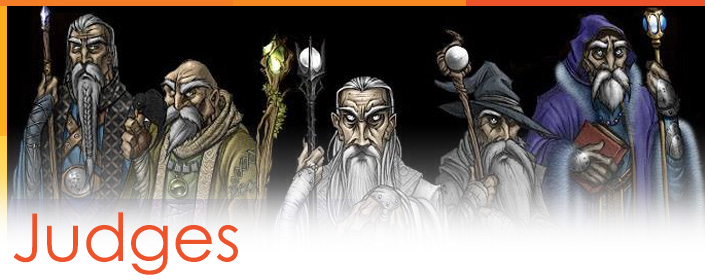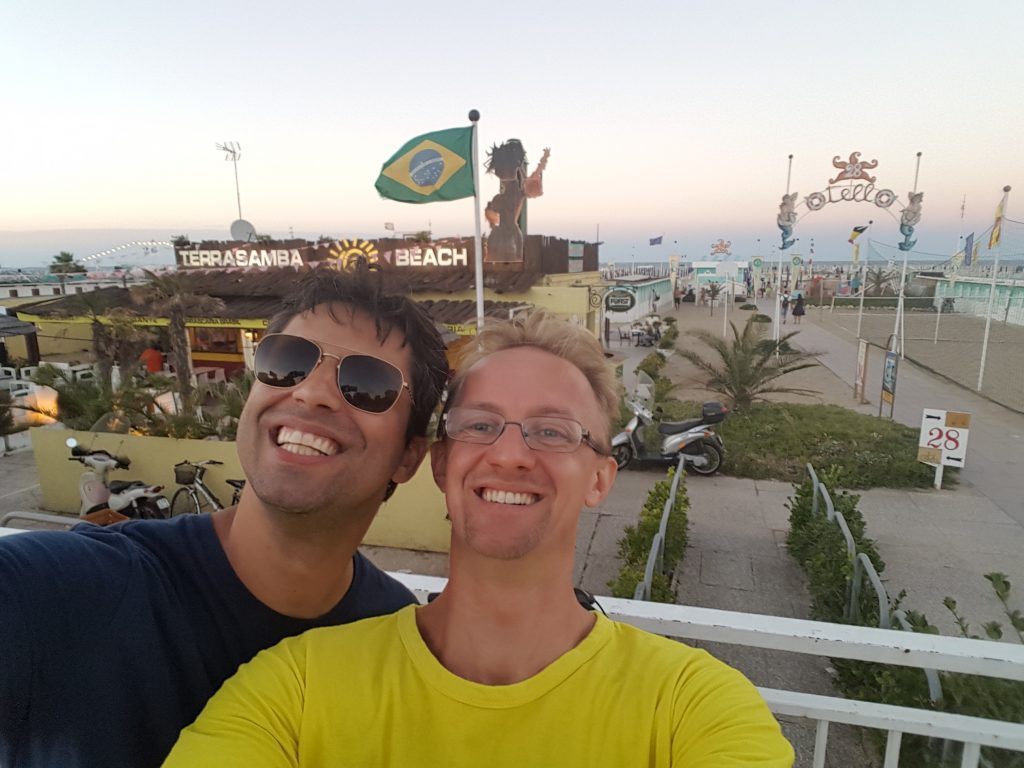On Demand Events: Results and Prizes
CIAO to everybody!
Today we will be travelling back to Europe… well, actually to my home country, Italy, where two GPs took place this year: Bologna in spring and Rimini in summer.
In the last two articles, we spoke about, we were discussing On Demand Events; we had our plans for registering all the people in line very quickly, and we had a plan to use the room efficiently; now it’s time to get these tournaments started and reported… everybody wants their prizes, right?
Happy reading.

Tournament Operations: On Demand Events – Results and Prizes
How is the On Demand Event area organized?
Here you have an overview, from above, on paper: (the post-it indicates the tournament number and the starting time)

Here you have a partial view of the real rows:

Here you have a zoom of a single table for eight people:

Here you have the very visible banner that can be used to indicate where to gather after registration, when the buzzer vibrates:

Here you have the table with the buzzers, sorted by tournament, waiting to be handed out:

Though some organizers prefer having judges in the playing area with the results sheet, the best system I found is to simply leave the paper with the brackets on the table.
The advantages are:
-Judges can dedicate their time to gather players and start the tournaments (“runners”) or answer calls (“floor”)
-Players don’t need to call for a judge to enter the results, and then to go to the prize station and collect their prizes
-Any judge can quickly check the status of any tournament, just by going to the table and checking on the paper with the brackets
After they are started by the judge, the tournaments are actually run by players themselves; this lowers the waiting times and also the number of judges needed, which results in a better service (the area is cleaner, the judges are available more quickly).
Prizes can be collected at a single prize station (used for all side events, both On Demand Events and scheduled/Swiss events), which is usually located next to the Prize Wall (“Here you have the tickets you won, and here you have all the prizes you can collect with your tickets!”).
While prizes for Trials/scheduled/Swiss events are managed by the individual head judges, prizes for On Demand Events (there can be hundreds of On Demand Events every day!) are managed at the single prize station, where a second copy of the brackets is brought, and kept in a tidy way:

This is another way to keep track of which areas are still used and which tournaments are still running, together with the map you can see in the first photo above.
When only the two finalists receive prizes, it’s easier, as both of them go together to the prize station to collect all prizes, and hand in the paper with the brackets and all the results.
When prizes are given to the semi-finalists too, the two people who lose the semifinals need to bring the incomplete paper with the brackets to the prize station, collect their prize, and bring the paper back to the playing table (hint: the playing tables and the prize station should be relatively close).
Pro Tip: if, for any reason or for any past negative experience, you are worried that the paper isn’t returned to the appropriate playing table, I’ll tell you a “secret”: every time we gave out the prizes and then we said “Could you please bring this paper back to where you were playing?” *with a smile*, the paper never got lost. (correct, it’s not a “pro tip”, it’s a “kind person tip” ^__^)
Finally, here you have the paper with the brackets and the full results:

On the right, you see the paper used by the players. On the left, the second copy, which is filled by the person in charge of the prize station and then given to the scorekeeper, who will enter all the results in the computer and send the final report to Wizards.
On the right: when prizes are given to a person, his name is marked off (or circled, as it was done only with one player here).
On the left: the X indicates if the winner is the player written at the top or at the bottom of each specific match (this is done to help the scorekeeper to enter the results faster); the name of the winner is written, as a way to control that the results (X above or X below the line) have been entered correctly, and the printed name of the winner is also circled (why so? have you got any friends with an *alien* handwriting? ^__^)
At the top: D-58 is a code that indicates that the format is D (draft) and the sequential number is 58; though the same two pieces of information can be found printed, writing them BIG at the top requires only a FEW seconds and makes it VERY easy to handle them (at the playing tables, at the prize station and by the scorekeeper).
OK, that’s all about how to organize On Demand Events, make good use of it!

Grand Prix Bologna & Rimini 2016
Bologna is a VERY old city in the north of Italy; the first settlements are from 1000 before Christ, and it evolved in the Etruscan, Celts and Roman periods. Though not as famous as Rome, Florence and Venice, Bologna is a wonderful city of arts.
A very curious fact: according to Wikipedia (the English version, not just the Italian version), Bologna has the very FIRST university in history, founded in 1088.
Another curious fact: Bologna is famous both in Italy and worldwide for its excellent food; in Italy for its tortellini, tagliatelle and crescentine, and worldwide for the “Bolognese sauce”, which is NOT actually called this way in Italy (what the hell?!? It’s like you foreigners modified the word “Pizza”, no way, it’s strictly forbidden!)

My favorite place to visit in Bologna is Piazza Maggiore, the very central plaza, with the statue of Neptune you see above!

Here you have a short video to have a glimpse of the city:
Rimini is a small city on the Adriatic Sea, founded by the Romans in 283 before Christ; though you can find a few interesting pieces of art, it’s nothing compared to the famous Italian cities.
So why did we organize our last Nationals and several Grand Prix events in an almost unknown city?
Rimini, together with Milan, is the Italian city with the most GPs (4); Turin will reach them at 4 next year.
Milan is famous and well connected to the rest of Europe by both trains and flights.
Turin is the first capital and it’s actually very beautiful.
But Rimini?!?
Here is what makes Rimini a famous city for a huge number of tourists in summer:

Yes, it’s one of the most famous touristic places, with its 16 kilometers of huge beaches, but you should know that it’s not at all the most beautiful sea (it’s actually one of the worst) or beach of Italy. If you love nature and you are planning a holiday at the sea in Italy, you must absolutely go to the south.
Curious fact: Rimini is famous in Italy as “party city”; yes, if you want hot nights, it might be the best choice in summer
My favorite place to visit in Rimini is, well, it’s outside Rimini, is San Marino, which is a microstate of only 61 square kilometers, at the top of a hill!

Here you have a short video to have a glimpse of San Marino:
JUDGE! Well, No, Not this Time
After almost 20 years of Grand Prix events, Italy has its own GP organizer: Legacy.
No, it’s not the format of the GP, it’s the name of the organizer!
Curious fact: in Rimini, there were two people who entered the main tournament with Legacy decks, and one of them actually won the first round and scored 3 points, with a Legacy deck at a Standard GP! It sounds impossible, right? How could it be? I will reveal it at the end of this section, if you want to think about it (no, it’s not “his opponent didn’t realize it”, which would be absurd in a high level tournament); it’s actually something possible at a tournament (no, it wasn’t “he got a bye”, though this would have been my guess and also the most probable solution).
For both GP Bologna and GP Rimini, I wasn’t in the role of a judge.
As I’ve been working with Legacy for something like ten years, first at their small PTQs and now at their huge GPs (Bologna had a total of more than 2000 participants, and there were a few moments when we actually ran out of space at side events), I was very pleased to keep working with them to make sure that the logistical aspects at side events were taken care of, since their first GP Florence 2015.
While the main event is the “big” tournament, and most of the judge resources are allocated there, side events can be a very interesting logistical challenge, especially when there are big (100 or more people) tournaments starting every half an hour (pro tip: the most difficult moment is lunch time).
Here you have two photos to give you a quick (and maybe funny) overview of my favorite control system for side events.
The first one is from GP Bologna 2016 and is the floor map for On Demand events:

The second one is from GP Lille 2016 and is the floor map for the entire side events, with judges included (there will be a future article about this):

It’s not antique, it’s not old technology, it’s not sloppy… it’s a gorgeous example of a very efficient and effective system, with an extremely low cost.

OK, I’m joking and I would use a different system for managing the logistics of the Olympic Games (right, I didn’t tell you what I would do if I retired from judging Magic events ^__^), but it’s part of a system
that actually allows me to answer the following questions in less than 30 seconds :
- Where is tournament X?
- When is tournament Y going to finish?
- Where is judge Z?
- Has judge A eaten yet?
- How many players and how many judges are at tournament XX?
Yes, these are actually easy questions (when I can implement that system); yes, it’s definitely a topic for a future article.

*One of the players with a Legacy deck waited for his opponent for ten minutes… and won the three point because the opponent didn’t show up!

Great Judges of the World: Philippe Monlevade
Philippe Monlevade doesn’t appear in the list of Hall of Fame judges or in the list of Pro Tour head judges, and not even (yet) in the list of Level 3 judges… but it appears that he’s becoming quite famous.
Winner of Grand Prix Buenos Aires 2014, judge manager for Brazilian GPs and world traveler (I checked our judge website, and I counted already 12 GPs in the first eight months of 2016, wow!), he’s one of the friendliest and smiling people you can find in the judge shirt!

Goodbye Italy

… and another awesome adventure has come to an end.
Goodbye Bologna, goodbye Rimini; next year I will skip Bologna (as that weekend I will be at GP Beijing) and our next meeting will be Turin, the gorgeous first capital! (and the city where I grew up… maybe my opinion of Turin might be a little biased by this ^__^)
If you want to add a comment and discuss this article in the Judge forums, click HERE.
All comments, feedback and advice are very welcome 🙂

